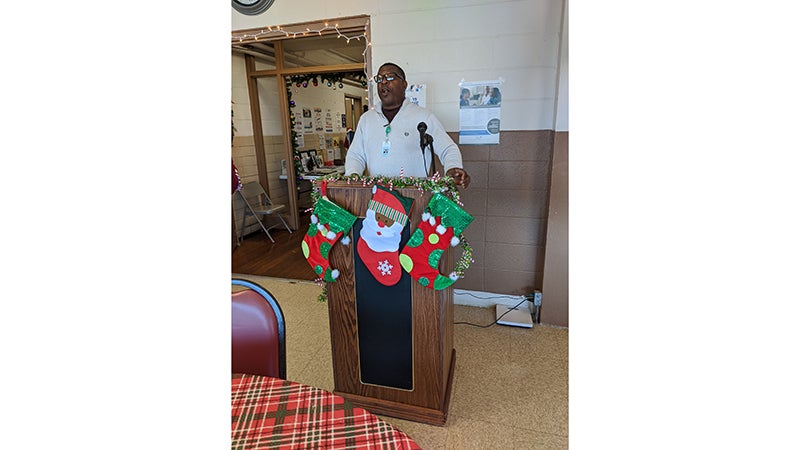Chaplain talks grief at Lanett Senior Center
Published 11:00 am Thursday, December 16, 2021

- Talking grief: Chattahoochee Hospice chaplain Michael Stiggers talks to seniors at the Lanett Senior Center about grief at an event in 2021. File photo by Cole Trahan.
|
Getting your Trinity Audio player ready...
|
Grief, by definition, is painful, and the social expectations surrounding it can make it even more difficult to deal with. This time of year can put grieving people in an awkward situation as friends and family members gather around them for the holidays. On Tuesday, Chattahoochee Hospice chaplain and bereavement coordinator Michael Stiggers told members of the Lanett Senior Center that it’s OK to feel however they feel at any time of year.
“There’s not a person on this Earth that does not grieve,” Stiggers said. “Everyone grieves. We all grieve differently.”
Stiggers said that people grieve more losses than death. He gave the examples of losing a spouse through divorce, losing one’s faith, losing a home, losing financial security, losing a business, losing a pet, and losing one’s physical health.
“One of my momma’s [major] losses — she lost her ability to drive,” he said.
Stiggers said his father also couldn’t drive but would sometimes ask if he could.
“Now, there’s one thing I need to tell you all today that’s some good news,” he said. “We learn how to live with our grief.”
Stiggers gave the example of him and his wife having to adapt to living with a child in their house.
“Somebody might say, ‘Well, you just do that naturally,’” he said. “No, you don’t just do that naturally because we were used to going everywhere. We used to just up and go.”
Stiggers explained that after having a child, he and his wife had to either bring the child and their things with them or leave the child with someone they could trust.
“Then, we had to learn how to live without children,” he said. “We are empty nesters.”
Stiggers said that his sister was killed by a drunk driver and his family had to learn to live with her absence. Sometimes they’d feel sad about it, and sometimes they’d remember the joyful times they had with her.
“There’s all types of grief and losses,” he said. “Now, I want you to recognize one that a lot of people don’t like to talk about, and that’s disenfranchised grief. Disenfranchised grief. That’s grief where you don’t get to grieve like everybody else.”
Stiggers said that within the past two years, it’s become common for people to ask if someone died of COVID-19, as if that’s a more painful loss than other causes of death. Additionally, he said that some types of deaths, such as death from suicide or death from AIDS in the 80s are more stigmatized. No matter what the cause of death, he said, people need to grieve.
Stiggers said that all sorts of emotions, including guilt, shame, blame and anger are commonly experienced in grief.
“Jesus experienced that,” he said. “Ya’ll remember? When Lazarus died, Mary and Martha blamed Jesus. They said, ‘If you had been here, my brother would not have died.’”
Stiggers told the audience not to be hard on themselves or others when they were grieving.
He finished his speech by going over a bill of rights for mourners. The list included the right to experience grief in one’s own unique way, to feel however one feels, to be treated as a capable person, to say no (or yes), to have privacy, to ask for help, to be listened to, to be treated with respect, to cry or not cry, to express one’s feelings, to talk about one’s grief, to be alone and to be given time to heal.




